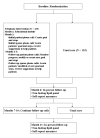Study protocol: Couples Partnering for Lipid Enhancing Strategies (CouPLES) - a randomized, controlled trial
- PMID: 19200384
- PMCID: PMC2652451
- DOI: 10.1186/1745-6215-10-10
Study protocol: Couples Partnering for Lipid Enhancing Strategies (CouPLES) - a randomized, controlled trial
Abstract
Background: Almost 50% of Americans have elevated low-density lipoprotein cholesterol (LDL-C). The behaviors required to lower LDL-C levels may be difficult to adhere to if they are inconsistent with spouses' health practices, and, alternatively, may be enhanced by enlisting support from the spouse. This trial extends previous trials by requiring spouse enrollment, teaching spouses how to provide emotional and instrumental support, allowing patients to decide which component of the intervention they would like to receive, and having patients determine their own goals and action plans.
Methods: Veteran outpatients with above-goal LDL-C (N = 250) and their spouses are randomized, as a couple, to receive printed education materials only or the materials plus an 11-month, nurse-delivered, telephone-based intervention. The intervention contains four modules: medication adherence, diet, exercise, and patient-physician communication. Patients decide which modules they complete and in which order; modules may be repeated or omitted. Telephone calls are to patients and spouses separately and occur monthly. During each patient telephone call, patients' progress is reviewed, and patients create goals and action plans for the upcoming month. During spouse telephone calls, which occur within one week of patient calls, spouses are informed of patients' goals and action plans and devise strategies to increase emotional and instrumental support.The primary outcome is patients' LDL-C, measured at baseline, 6 months, and 11 months. Linear mixed models will be used to test the primary hypothesis that an 11-month, telephone-based patient-spouse intervention will result in a greater reduction in LDL-C as compared to printed education materials. Various process measures, including social support, self-efficacy, medication adherence, dietary behavior, and exercise, are also assessed to explain any change, or lack thereof, in LDL-C.
Discussion: Given the social context in which self-management occurs, interventions that teach spouses to provide instrumental and emotional support may help patients initiate and adhere to behaviors that lower their LDL-C levels. Moreover, allowing patients to retain autonomy by deciding which behaviors they would like to change and how may improve adherence and clinical outcomes.
Trial registration: The ClinicalTrials.gov registration number is NCT00321789.
Figures
Similar articles
-
Mechanisms of patient health behavior change in a randomized controlled trial of a spouse-assisted intervention.Psychol Health Med. 2015;20(7):753-66. doi: 10.1080/13548506.2015.1020817. Epub 2015 Mar 16. Psychol Health Med. 2015. PMID: 25774698 Clinical Trial.
-
A randomized controlled trial to evaluate the effectiveness of CouPLES: a spouse-assisted lifestyle change intervention to improve low-density lipoprotein cholesterol.Prev Med. 2013 Jan;56(1):46-52. doi: 10.1016/j.ypmed.2012.11.001. Epub 2012 Nov 9. Prev Med. 2013. PMID: 23146744 Clinical Trial.
-
What Do US Physicians and Patients Think About Lipid-Lowering Therapy and Goals of Treatment? Results From the GOULD Registry.J Am Heart Assoc. 2021 Aug 17;10(16):e020893. doi: 10.1161/JAHA.120.020893. Epub 2021 Aug 7. J Am Heart Assoc. 2021. PMID: 34369165 Free PMC article.
-
Telephone interventions for symptom management in adults with cancer.Cochrane Database Syst Rev. 2020 Jun 2;6(6):CD007568. doi: 10.1002/14651858.CD007568.pub2. Cochrane Database Syst Rev. 2020. PMID: 32483832 Free PMC article.
-
Beyond low-density lipoprotein: addressing the atherogenic lipid triad in type 2 diabetes mellitus and the metabolic syndrome.Am J Cardiovasc Drugs. 2005;5(6):379-87. doi: 10.2165/00129784-200505060-00005. Am J Cardiovasc Drugs. 2005. PMID: 16259526 Review.
Cited by
-
Emerging models for mobilizing family support for chronic disease management: a structured review.Chronic Illn. 2010 Mar;6(1):7-21. doi: 10.1177/1742395309352254. Chronic Illn. 2010. PMID: 20308347 Free PMC article. Review.
-
Interventions to enhance adherence to dietary advice for preventing and managing chronic diseases in adults.Cochrane Database Syst Rev. 2013 Feb 28;(2):CD008722. doi: 10.1002/14651858.CD008722.pub2. Cochrane Database Syst Rev. 2013. PMID: 23450587 Free PMC article.
-
Perceived social support for diet and exercise among persons with serious mental illness enrolled in a healthy lifestyle intervention.Psychiatr Rehabil J. 2013 Jun;36(2):65-71. doi: 10.1037/h0094973. Epub 2013 May 6. Psychiatr Rehabil J. 2013. PMID: 23647144 Free PMC article.
-
Spouse health behavior outcomes from a randomized controlled trial of a spouse-assisted lifestyle change intervention to improve patient low-density lipoprotein cholesterol.J Behav Med. 2014 Dec;37(6):1102-7. doi: 10.1007/s10865-014-9559-4. Epub 2014 Mar 2. J Behav Med. 2014. PMID: 24584818 Clinical Trial.
-
Use of motivational techniques to enhance unpaid caregiver engagement in a tailored skills training intervention.Aging Ment Health. 2022 Feb;26(2):337-344. doi: 10.1080/13607863.2020.1855103. Epub 2020 Dec 16. Aging Ment Health. 2022. PMID: 33325259 Free PMC article. Clinical Trial.
References
-
- American Heart Association. Dallas, TX; 2003. Heart disease and stroke statistics – 2003 update.
-
- Third report of the National Cholesterol Education Program Expert Panel on detection, evaluation, and treatment of high blood cholesterol in adults. National Heart, Lung, and Blood Institute; 2001. - PubMed
-
- Brookhart MA, Patrick AR, Schneeweiss S, Avorn J, Dormuth C, Shrank W, van Wijk BLG, Cadarette SM, Canning CF, Solomon DH. Physician follow-up and provider continuity are associated with long-term medication adherence: A study of the dynamics of statin use. Arch Intern Med. 2007;167:847–852. doi: 10.1001/archinte.167.8.847. - DOI - PubMed
Publication types
MeSH terms
Substances
Associated data
LinkOut - more resources
Full Text Sources
Medical
Miscellaneous






